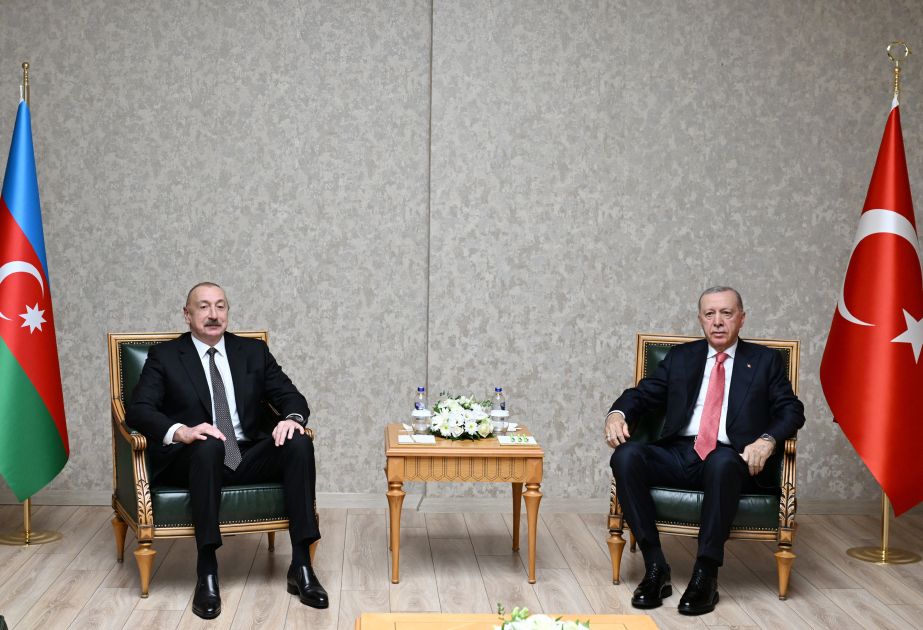President of Azerbaijan Ilham Aliyev’s working visit to Türkiye
on June 19 carries powerful symbolic and humanitarian significance,
as it marks his arrival in Kahramanmaraş—a city still healing from
the devastation of the February 2023 twin earthquakes. President
Aliyev was warmly welcomed by his Turkish counterpart, President
Recep Tayyip Erdoğan, at the Kahramanmaraş International Airport,
where a guard of honor was lined up in his honor, underscoring the
strength of bilateral ties that go far beyond diplomacy.
The visit comes at a time when the fruits of Azerbaijan’s
support in Türkiye’s post-earthquake recovery are fully visible.
Among the most striking examples is the Azerbaijani-funded
“Azerbaijan Neighborhood,” a large-scale residential and social
complex built in Kahramanmaraş to house victims of the
disaster.
This initiative is part of broader efforts that began
immediately after the 7.8 and 7.6-magnitude quakes struck Türkiye
on February 6, 2023, affecting 11 provinces, killing over 50,000
people, and leaving millions displaced. Azerbaijan was among the
first nations to respond. On the instructions of President Aliyev,
planes loaded with humanitarian aid and a 700-member rescue team
from the Ministry of Emergency Situations were dispatched to the
affected areas. Azerbaijani rescue teams worked alongside Turkish
emergency services, helping save lives under extraordinarily
difficult conditions.
Beyond the emergency phase, Azerbaijan committed to long-term
recovery, focusing on physical reconstruction and social stability.
The “Azerbaijan Neighborhood” in Kahramanmaraş is a defining symbol
of this commitment. The complex includes over 1,000
earthquake-resistant apartments, a school named after national
leader Heydar Aliyev, a kindergarten, a mosque, a cultural center,
and multiple commercial and service areas.
President Erdoğan, in a post shared on his official social media
account, referred to the project as “fraternity in action,” noting
that 49,056 jobs and residential units had been constructed in the
area. “With this initiative, the number of apartments handed over
after the earthquake has reached 250,000,” he added, thanking
Azerbaijan for its extraordinary contribution.
The $100 million initiative is being coordinated by the State
Housing Construction Agency of Azerbaijan (MIDA), covering a total
area of 32 hectares. The reconstruction plan not only supports
shelter but also aims to restore entire communities. Schools,
retail spaces, and social services are designed to ensure that life
can resume in a dignified, secure, and cohesive environment.
Azerbaijan’s assistance has also extended beyond Kahramanmaraş,
with parallel reconstruction projects underway in other affected
regions such as Hatay and Adıyaman. These efforts include building
new hospitals, schools, and public infrastructure, along with
psychosocial support centers and employment initiatives to help
locals rebuild their lives and livelihoods.
The Azerbaijani people, too, responded en masse. Through the
“Brotherly Aid” campaign and organizations like the Yashat
Foundation, thousands donated funds, blood, and supplies. Civil
society, NGOs, and businesses rallied together to provide both
immediate and long-term relief.
What makes this relationship extraordinary is not only the scale
of support, but the spirit behind it. Azerbaijan’s aid was never
transactional; it was personal, heartfelt, and rooted in a deep,
shared history and identity. The dual flags flying over the
Azerbaijan Neighborhood and the monument erected in its center
symbolize a partnership that is emotional as much as it is
strategic.
In this context, President Aliyev’s visit is more than a
diplomatic gesture—it is a reaffirmation of a shared destiny. It
sends a clear message: when one nation is in crisis, the other will
respond—not out of obligation, but out of fraternal duty.
As finishing works near completion in several quarters of the
Azerbaijan Neighborhood and construction continues in others, these
buildings will stand as enduring testaments to the solidarity
between the two nations. They are not just physical structures—they
are embodiments of resilience, loyalty, and mutual trust.
In a world where alliances are often transactional and
short-lived, the Azerbaijan-Türkiye relationship remains anchored
in something deeper: a bond forged in adversity, sustained by
mutual respect, and strengthened through every challenge faced
together.

